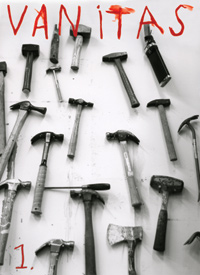|
||
      |
Peer Review ::
Translation triage
Translator and poet Vincent Katz puts on his operating gloves.
“You have to be like a surgeon,” says Vincent Katz, AB’82, of translation. “You really have to know what you’re doing.” Honored by the American Literary Translators Association for his rendition of the complete elegies of Sextus Propertius—a contemporary of Virgil and Horace regarded as one of the most challenging ancient poets to adapt—Katz seems to have the art mastered.

Jim Dine, cover for Vanitas 1, 2005.
Scholars usually have blamed Propertius’s difficulty on hand-copying errors passed down over centuries. Katz isn’t so sure. “If something is bizarre or unprecedented in a Latin poem,” he says, “it doesn’t mean it was not original, that it wasn’t there.” After all, poets thrive on using words in unorthodox ways. Well-intentioned translators, Katz contends, are often too hasty in abandoning original syntax. He is more inclined to “let those oddities exist.”
A poet with eight books to his credit, Katz knows how writers labor over word choice. Heavily influenced by the work of Frank O’Hara—who often wrote on the fly while “in the midst of doing ten other things”—Katz’s poems capture fleeting moments from Park Avenue to Paris. He further hones his wordplay as an art critic, contributing to publications such as ARTnews, Art in America, and Aperture.
The son of contemporary painter Alex Katz, he finds that visual art and poetry go hand-in-hand. “For me,” he notes, “there’s always been this desire to be around visual artists. There’s a kind of sustenance poetry gets from being around art.” Following the tradition of O’Hara and James Schuyler from the New York school of poets—a group of 1950s writers closely associated with painters of the abstract-expressionist movement—Katz complements his poetry with critical and curatorial work.
His list of upcoming projects reveals his diverse interests. Rapid Departures (Ateliê Editorial), a selection of his poems written in Brazil and accompanied by drawings from artist Mario Cafiero, comes out this month in a bilingual English–Portuguese edition. Another collaboration—a collection of poems and watercolor images reflecting his time in Italy during a 2001 John Guare Writer’s Fund Rome Prize fellowship—is under way with painter and poet Francisco Clemente. On the solo end, Katz will visit Hyde Park January 26 to discuss his Propertius translations as part of the Humanities Division’s Poem Present series (See “Center Stage”). He also heads the poetry and arts journal Vanitas and its sister publishing project, Libellum Books. He’ll begin work on a novel during a guest residency at the American Academy in Berlin this spring.
For Katz—who grew up watching his father keep a rigorous schedule in the studio adjoining their Manhattan home—art is not the stereotypical “wild inspiration in the middle of the night and drunken sprees and hedonism.” Although “that can be part of the substance of art,” he notes, “making it is much more work-oriented.” Surrounded by his parents’ poet and critic friends, he found the world of writing to be filled with approachable, “normal people who were out and about,” not “locked up in some ivory tower surrounded by dusty books.”
Not that he has anything against dusty books. As a classics and music concentrator at the University, Katz delved into the odes of Horace, Catullus, and others, often combining verse with music the way ancient Greeks and Romans did. Classics professor Anne Pippin Burnett, he recalls, knew he was a pianist and encouraged him to compose music in place of the standard essay for a Prometheus project. “I’ve never forgotten that,” he says, “because when I come to do something now, that will be an example to me to say, ‘Wait a minute, you don’t have to treat it in a strictly academic way.’”
Katz continues to use experimental methods to stimulate his creativity. In the poem “Painted Life” (Understanding Objects, 2000), he abandons sentences in favor of a musical approach, writing quickly so that each word acts as a single note in a larger composition. His poetry collaboration with artist Tabboo! (Pearl, powerHouse Books, 1998) began as a notebook guided by two rules: no editing during the writing process and no writing except late at night, “in a somewhat dreamy state of mind.” Katz, who prefers pens, pencils, and manual typewriters to computers, has already planned his next twist: the upcoming book with Clemente will substitute standard typeface with handwritten poems.
As Katz’s creative toolbox continues to broaden, so does his poetic repertoire. Afraid that his “place poems” would become routine, he took advantage of his Rome fellowship year to experiment with a more “interior” style. “I want my poems to be memorable,” says Katz. “It is easy to be original, difficult to be memorable.” If the past is any indication, he has little risk of slipping into oblivion.